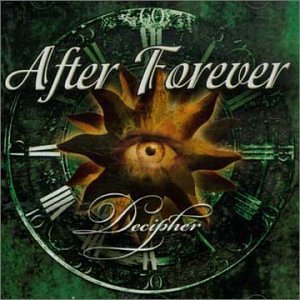 |
| Source: Wikipedia |
Band: After Forever
Album: Decipher
Year: 2001
Score: 9.5/10
“Probably the Best
Symphonic Metal Album Ever”
For me, symphonic metal has always been an iffy topic. Some bands are incredible, but many are just
plain mediocre. One of the standout
bands in the genre has always been After Forever. Decipher
is the band’s magnum opus- a challenging work that, for me, defines the
symphonic metal genre.
The overall feel of the album is dark and elegant. Layers of guitar are supported by deep
orchestral backdrops… perhaps it could be described the other way around as the
orchestra often provides the lead melodies for the songs (“Monolith of Doubt”, “Intrinsic”)
even though the guitars are more powerful.
The songs are often brooding and complex. The structures are experimental for the
genre, and honestly the most experimental I’ve heard from the band. Due to this, there is an element of progressiveness
to the songs. There is also a surprisingly
good sense of dynamics. Many songs
contain soft passages weaved throughout the heavy riffs, making the songs more
intriguing. One of the only true
downfalls is that the album gets a bit monotonous. The songs are somewhat similar and often
follow a similar pattern. Given my
high score it’s obviously not a huge part of the experience but, it does
deserve to be noted.
The individual performers are good at what they do. Obviously, the vocals are where the album
shines the most. Floor Jansen is easily
one of my favorite vocalists, and Decipher
contains some of her finest performances.
Her vocals are far more operatic on this album than on the later work of
After Forever, and she uses this operatic style alongside an equally effective
style more reminiscent of rock vocals.
The guitars are largely rhythmic, usually playing support to the
orchestra. They are highly precise and
suit the music well. The keys are
similar to the guitars, that is, they play support to the orchestra. They tend to be more atmospheric than the
guitars and, thus, are not nearly as irritating as the keys of similar
bands. As mentioned previously, the
orchestra (along with the vocals) provides the melodies for the songs. These instruments are actually kind of low in
the mix, which lends an atmospheric feel to the album- very tasteful. The drums and bass guitar are solid for the
genre, both being precise but not particularly flashy. The only low point in performance is the
harsh male vocals. They’re way too
polished, almost as if a robot was grunting into the microphone. The high growls are particularly annoying. Other than this, the harsh vocals are used
well. That is, they are well placed and
suit the songs and Floor Jansen’s voice.
So, overall, they’re tolerable but not much more than that.
After the atmospheric introduction “Ex Cathedra”, the album
truly begins with the steady rocker “Monolith of Doubt”. It’s not my personal favorite but is,
nevertheless, a very good opening song.
It’s followed by the more impressive “My Pledge of Allegiance #1”, a
progressive tune with an Arabic influence in the melodies. This is easily one of my favorites off of the
album for many reasons, most notably the complexity of the song and the catchy
melodies. Floor Jansen has some very
impressive vocal moments throughout this song, in particular. Following this song is the very accessible “Emphasis”
and the elaborate “Intrinsic”. The
former is the easiest song to listen to on the album, while the latter is a
slow-building piece with a truly fantastic climax. “Intrinsic” is, without a doubt, another
favorite from the album. The next piece,
“Zenith”, isn’t exactly bad- I just do not like it as much as the previous
songs. Still, it’s an excellent piece and
well worth a mention.
The next song is the incredible “Estranged (A Timeless
Spell)”, another excellent piece where the vocals are complemented perfectly by
the rhythmic guitars. “Imperfect Tenses”
comes next. It’s a ballad and my least
favorite from the album. While it’s not
awful, it does become cheesy and irritating after awhile. This is the song I am most compelled to
skip. Luckily the second installment of “My
Pledge of Allegiance” comes next. It
pretty much follows the trend of the first song and ends up being successful,
though not quite as good as the other song in the saga. “The Key” follows and features one of the
best vocal performances from the band.
It was my first favorite, and is still my “go-to” song from the album. The closing song is entitled “Forlorn Hope”
and is a fitting way to end the album. It’s
intense, in the vein of the “My Pledge of Allegiance” saga and ends up being a
favorite; a classy ending to a lovely album.
There’s also a bonus track called “For the Time Being” that is
surprisingly good and worth checking out with the other songs.
Decipher will
certainly be enjoyed by fans of symphonic metal and possibly even fans of
gothic, progressive, and power metal. It’s
a diverse album filled with majestic twists and turns. I’m skeptical to say that this will be a
metal classic one day, but it might be.
It will certainly be a classic to those who are into the more melodic
forms of heavy metal. Therefore, I
recommend it to such people; fans of heavier forms of metal should give songs
like “The Key” and “My Pledge of Allegiance #1” a shot. Decipher
is a very impressive album, I highly recommend it.
Best songs: “The Key”,
“Emphasis”, “Intrinsic”, “Estranged (A Timeless Spell)”, both of the “My Pledge
of Allegiance” songs, and “Forlorn Hope”.
Thanks for reading!
Be sure to comment!
